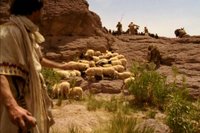The Ten Commandments (2006) - Part 1 Scene Guide
 Last week I mentioned the new Ten Commandments film that is coming to ABC on the 10th and 11th of April. Having watched my review copy yesterday, I'll be posting my review for the film in a few days, but for now I thought I'd whet some appetites by posting the scene guide. I'm assuming the story is well enough known for there to be no spoilers as to content ("they escape from Egypt how?"), but, for now, I'll simply describe the scenes not taken from the bible as "non-scriptural episode" so I don't ruin all the fun. I'll just do part 1 today. Part 2 will follow tomorrow
Last week I mentioned the new Ten Commandments film that is coming to ABC on the 10th and 11th of April. Having watched my review copy yesterday, I'll be posting my review for the film in a few days, but for now I thought I'd whet some appetites by posting the scene guide. I'm assuming the story is well enough known for there to be no spoilers as to content ("they escape from Egypt how?"), but, for now, I'll simply describe the scenes not taken from the bible as "non-scriptural episode" so I don't ruin all the fun. I'll just do part 1 today. Part 2 will follow tomorrow Part 1
> non-scriptural episodes
Slaughter of the infants (Ex 1:22)
Moses put into the river (Ex 2:1-3)
Princess finds Moses (Ex 2:3-6)
Jochebed nurses Moses (Ex 2:7-10)
> non-scriptural episode
Moses kills an Egyptian (Ex 2:11-15a)
Moses in the desert (Ex 2:15b)
Jethro's dauthers at the well (Ex 2:16-20)
Moses marries Zipporah (Ex 2:21)
Gershom is born (Ex 2:22)
The Burning Bush (Ex 3:1 -4:17)
Return to Egypt (Ex 4:18-23)
> non-scriptural episodes
Moses asks Ramsees (Ex 5:1-3; Ex 7:8-11)
Bricks without straw (Ex 5:4-21)
> non-scriptural episode
Plague of blood (Ex 7:14-24)
Plague of frogs (Ex 8:1-8:15)
Plague on livestock (Ex 9:1-7)
Plague of locusts (Ex 10:1-20)
Plague of boils (Ex 9:8-12)
Plague of hail (Ex 9:13-25)
Passover (Ex 12-1:28)
Death of the Firstborn (Ex 12:29-30)
Pharaoh releases the slaves (Ex 12:31-36)
The Exodus (Ex 12:37-42)
Moses takes Joseph's bones (Ex 13:19)
Pillar of cloud and fire (Ex 13:21)
Pharaoh changes his mind (Ex 14:5-8)
Parting of the sea (Ex 14:10-22)
 A Few Notes:
A Few Notes:The opening scenes are over fairly swiftly in comparison to DeMille's 1956 version. In fact, here as in the Bible Collection's Moses (starring Ben Kingsley) the parting of the Red Sea occurs exactly at the halfway point in the film.
Like most Moses films, this one abbreviates the plagues to just 7, the gnats, flies and darkness are all omitted.
The additional material in this part of the film is fairly tight, rounding out the characters, and bringing a more narrative shape to the material, whilst still keeping the biblical material at the film's core.
It's interesting that in contrast to most Moses films, in particular the 1956 version and The Prince of Egypt (1998), Moses is not shown with either Pharaoh prior to issuing God's demands. Exodus is not concerned with this question but historically speaking this version of events is, I believe, the more plausible.
Labels: Moses, Scene Guides, Ten Commandments (2006)














3 Comments:
At 12:47 pm, April 05, 2006, Anonymous said…
Anonymous said…
Very cool, Matt. Is it appropriate for younger kids?
At 1:36 pm, April 05, 2006, Matt Page said…
Matt Page said…
I would have to say "no". It's probably on a par with the Lord of the Rings films in terms of violence.
Part 2 shows the battle with the Amalekites with a fair bit of "chopping", and to the film's credit (in my opinion) it gives an unflinching portrayal of Ex 32:25-29, rather than attempting to soften this part of the story as DeMille does.
Part 1 is less violent, but young children might be uncomfortable with a scene showing the mumification process, or when Moses rescues Jethro's daughters.
That said, I do definitely think that those scenes are artistically justified.
At 11:57 am, January 04, 2008, Anonymous said…
Anonymous said…
Part One is very interesting. It begins with Pharaoh having a dream, and an oracle prophesying that a child among the slaves had been born who would bring the Egyptian dominion low, and lead the Hebrews to freedom. This is not in the Bible, however, this account is present in the Jewish Midrash, and in 'Antiquities of the Jews' by Josephus. Writer Ron Hutchinson remarkably put in plenty of sensible extra material, such as when Pharaoh Rameses questions Moses, "God's quarrel is with me. Why must all my people suffer because of it?" I was very impressed with Part One, and the Visual Effects were superb, almost too good for Television.
Also, thanks for the entry Matt!
Post a Comment
<< Home